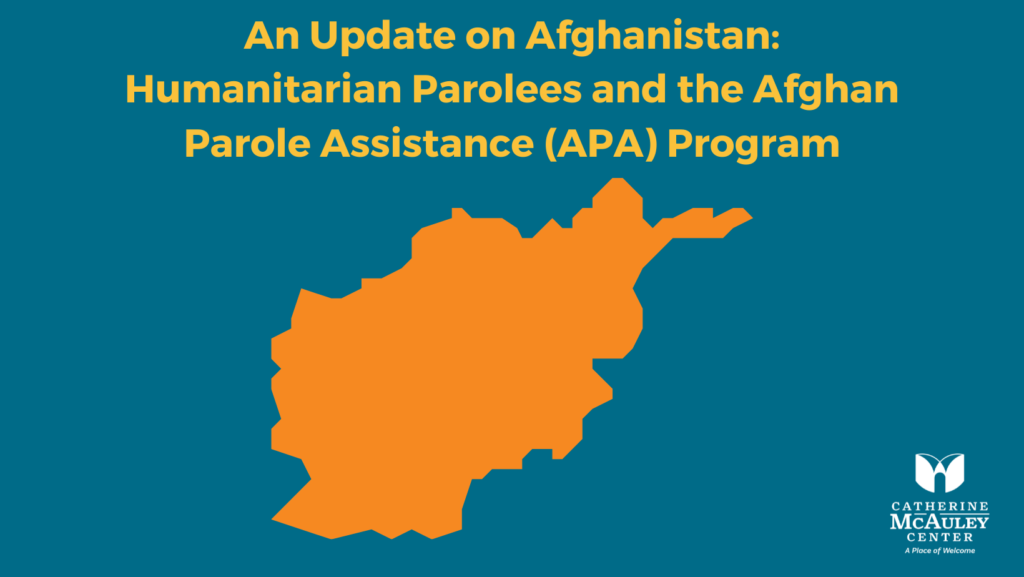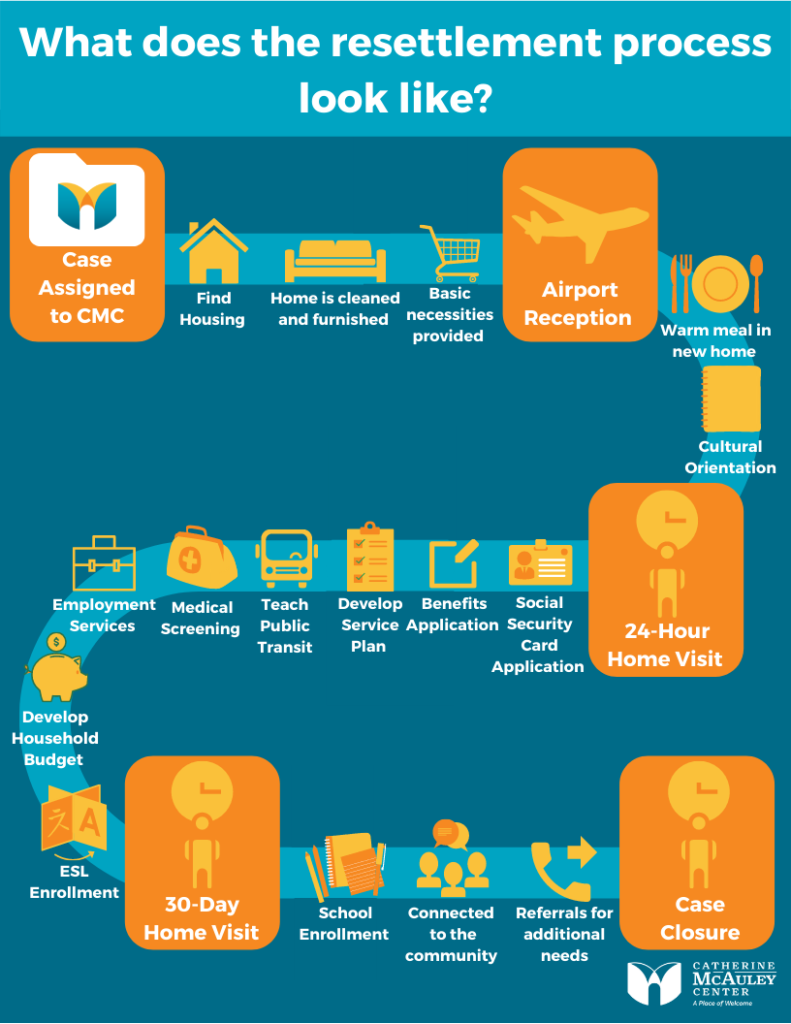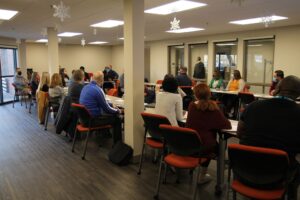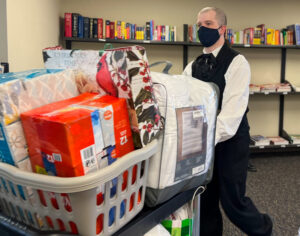 Staff have been busy since you last heard from the Catherine McAuley Center (CMC) about Afghan resettlement. Since the Afghan Parolee Assistance Program was created to provide resettlement services to Afghan evacuees in the fall, CMC has welcomed 130 Afghans to Eastern Iowa – that’s almost double the number of refugees we resettled in all of last year!
Staff have been busy since you last heard from the Catherine McAuley Center (CMC) about Afghan resettlement. Since the Afghan Parolee Assistance Program was created to provide resettlement services to Afghan evacuees in the fall, CMC has welcomed 130 Afghans to Eastern Iowa – that’s almost double the number of refugees we resettled in all of last year!
In fact, 85 of these newcomers arrived in just two weeks — the week before and of Thanksgiving. While refugee arrivals are normally paced out throughout the year, arrivals of Afghans have been expedited to allow the government to close the military bases where Afghans have been staying. CMC could still receive up to 250 Afghans this year, plus 150 refugees from other countries (down from 300 expected in this category).
Service Plan
The federal grant that guides resettlement work outlines the many services that must be provided within the first 90 days after a refugee or Afghan arrives in the local community. For CMC to provide quality services requires us to know our clients well – to understand their strengths, the barriers they will face, and their personal and family goals. While basic information like number of family members, names, ages, and genders are available prior to arrival, more descriptive information isn’t available until case managers meet them at the arrival. As such, one of the first tasks we undertake is creating a service plan for each case. A service plan identifies:
- The family or individual’s work history and employment goals
- Needed services and referrals throughout the community
- The family’s goals and expectations, such as whether both parents will work or one will stay home
- Basic household budget to establish needs as they work to become economically self-sufficient.
Once this plan is created, we are able to coordinate services with our many partners across the community.

Our Partners
Resettlement agencies rely on many private and public sector partners throughout the community. These partners are critical in times of high numbers of new arrivals like we have experienced over the past six weeks:
-
- Housing: While CMC has a network of area landlords who can provide permanent housing to newly arrived refugees, temporary housing has been necessary in the face of such a large number of arrivals. To meet the immediate need, a local hotel has provided temporary housing for Afghan arrivals until permanent housing can be found. Clients have access to a kitchen so they can be self-sufficient in providing meals.
- Health: Linn County Public Health has been working with CMC’s Healthcare Navigator to assess and meet the medical needs of each newcomer, including health assessments, establishing primary care, immunizations, and meeting dental healthcare needs.
- Benefits: CMC has been working closely with the Department of Human Services (DHS) and the State of Iowa to ensure that Afghans receive all benefits that they are eligible for. This has included coordination with Iowa Finance Authority and the Bureau of Refugee Services.
-

On December 15, employers were invited to attend an informational session about hiring immigrants and refugees, hosted by the Catherine McAuley Center and IowaWORKS. Employment: While CMC has an existing network of employers who frequently hire immigrants and refugees, a partnership with IowaWORKS has grown the number of employer connections open to clients, ensuring they have access to a variety of types of work to help them find stability.
- School Enrollment: CMC, College Community School District, and Cedar Rapids Public Schools have been coordinating to ensure the necessary paperwork has been completed to enroll children in school as soon as they are ready, though this ultimately depends on clients’ permanent housing location.
- ESL: To ensure maximum access to language learning opportunities, CMC and Kirkwood have been working together to assess each adult to ensure proper placement into Kirkwood’s free English classes and into CMC’s 1:1 tutoring.
- Parent support: CMC has been coordinating with YPN to ensure parents have support and resources necessary as they begin their parenting journey in a new country.
- Cultural Orientation & Transportation: Thanks to the hard work of several RefugeeRISE AmeriCorps members, newcomers are learning the basics of what to expect of life in America and what is expected of them, along with bus orientation, where clients learn how to navigate the public transit system to access places like the mosque, CMC, the bank, and grocery stores, etc.
- Entertainment & Socialization: CMC has been working with several organizations like Linn County Conservation (Wickiup Hill) and The Play Station to offer field trips for Afghan youth who have been living at the hotel so they are able to explore the fun things that Cedar Rapids has to offer.
 Supplies: Thanks to the generosity of our neighbors, CMC has been able to deliver donations of winter clothing and shoes, baby items, health and hygiene products, as well as toys and books for Afghans.
Supplies: Thanks to the generosity of our neighbors, CMC has been able to deliver donations of winter clothing and shoes, baby items, health and hygiene products, as well as toys and books for Afghans.
Challenges and Next Steps
Though the Catherine McAuley Center has the infrastructure in place and the partnership support to offer the services above, one of the biggest challenges to providing services is the delay in receiving required documentation. Though Afghans applied for their Social Security cards and Employment Authorization documents while they were at military bases, those cards are sent to D.C. before being mailed out to local offices where Afghans are being resettled, meaning employment must wait in some cases.
The availability of permanent housing is also a key factor in providing other resettlement services like employment and school enrollment, and must be selected carefully based on case managers’ familiarity with each client, their needs, and employment prospects. Not only must housing be safe and fit within a family’s budget, but would also ideally be in close proximity to people who speak the same language so they can support one another.
Because the past several months have been marked by so much change and instability for Afghans, staff have been intentional in ensuring housing placement is the right fit for a family, and that they won’t face other significant changes that can be avoided. For example, staff have opted to wait to enroll children in school until permanent housing is established so children are able to start at new schools with the comfort of knowing they can make friends and get to know their teachers without fearing having to leave and start over once again. Additionally, establishing employment comes before ESL classes, so that working adults know their job schedule before signing up for class.
How to Support

The Catherine McAuley Center still welcomes volunteers, supply donations, and other methods of support community members can offer through this Google Form. However, perhaps one of the greatest current needs is for permanent housing so that Afghan clients can move out of the temporary hotel housing and begin their routines in their new homes. With 130 arrivals so far and more on the way, staff are working to find housing for a large number of people at once. Houses or apartments for rent that have private and secure entrances are preferred over spaces within another family’s home.
We welcome landlords or others with connections to housing to share those opportunities with staff through this form:
Many thanks to the volunteers, supporters, and partners who have shared time and resources to help Afghans find stability in Eastern Iowa, and for joining with the Catherine McAuley Center in the next stages of resettlement.

